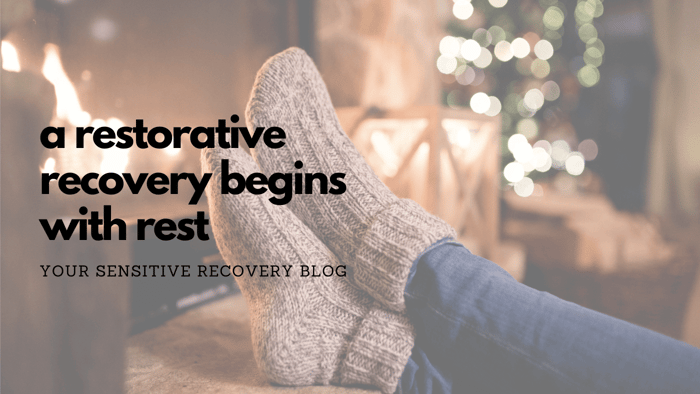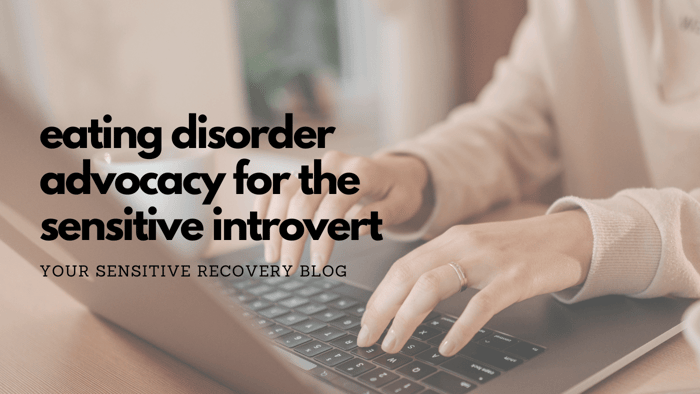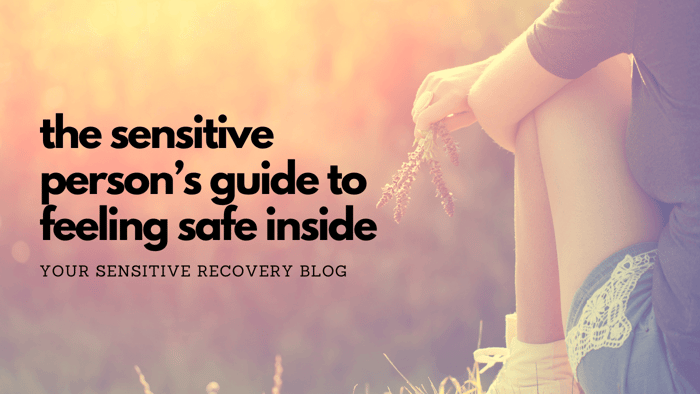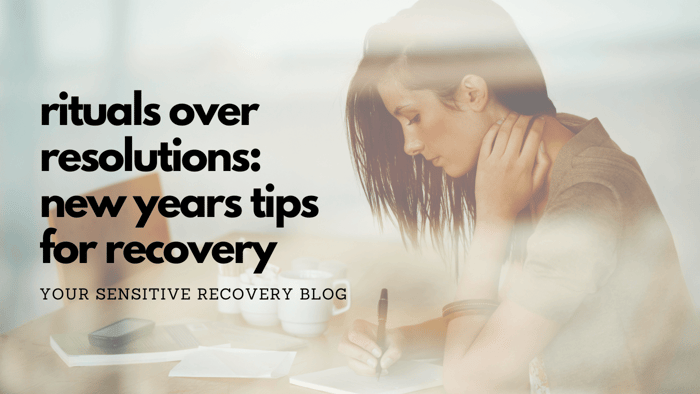We're in a season that historically has been a time of turning inward, recharging, and embracing rest. It's a natural rhythm reflected in the quiet and stillness of winter. But in today’s go-go-go world, the holidays and the societal pressures of "New Year, New You!" demand the opposite of us: a relentless pace fueled by consumerism, social obligations, and the pressure to do more and BE more. This pressure can be overwhelming for anyone, but especially if you're a sensitive human in recovery from disordered eating.
In this post, I'm exploring why rest is challenging for many of us and how it's not only a gift to give yourself (now and beyond the holidays) but a necessity for your healing journey. You'll also learn some simple ways you can reclaim the season's natural, restorative rhythm and prioritize being over doing.
Why Rest is Essential for Highly Sensitive People
As a Highly Sensitive Person (HSP), your brain is wired to be extra sensitive to stimuli. You take in and process more information from your environment than non-HSPs do.
Because of this fact, sensitive folks require more time to rest and recharge in order to avoid overstimulation, and when you aren't willing or able to give yourself that time, your overstimulation can turn to full-blow overwhelm.I don't know about you, but my line between overstimulated and overwhelmed is pretty fine. My heart rate starts to increase, my breath becomes more shallow, and if I had a visual representation of my thoughts, it would look like an out-of-focus pinball machine game. From here, if I don't take steps to engage in grounding techniques or change my environment, I'll quickly enter shut-down mode.
When I am well-rested (and I'm not just talking about getting enough sleep at night - more on that soon), I can recognize overstimulation more easily and am better equipped to manage it.
The Role of Rest in Eating Disorder Recovery
Consistent, unmanaged overstimulation takes a toll on our overall well-being and is fertile ground for the siren call of eating disorder urges that promise release, relief, and reward. Disordered behaviors in Highly Sensitive People often stem from a desire to control or escape experiences like overstimulation and overwhelm and challenging emotions related to them.
Rest is essential for recovery because it provides space for emotions to rise to the surface and be processed - meaning we can listen to and understand their messages, often regarding what we want and need. Recovery is about honoring these needs and the truest version of yourself. So many folks get stuck in recovery because they begin to compare their journey to someone else's and try to rush the process. Feeling rushed, experiencing relapses, and wanting to throw in the towel are all signs that you could benefit from a more restful approach.
Eating disorders are damaging to health not just for obvious reasons but because of the insidious way they perpetuate bodily stress and trauma when they often develop as a way to try to mitigate these things. The restoration of physical health in recovery, in addition to mental and emotional health, cannot occur without intentional, adequate rest.
Common Barriers to Rest in HSPs
A dear friend once shared with me what happens to her when she sits on the couch for a break during the day. The "should-ing" begins and she's immediately overcome with guilt - afraid that if she's witnessed just sitting there (when there are tasks she could be attending to), she'll be seen as lazy and unproductive. It breaks my heart because this amazing woman not only does so much, but IS so much - to me, to her loved ones, and to her community.
The HSP struggle with rest often stems from the fear that we'll be perceived negatively by others.
We're already used to being labeled as different, and often too much or not enough of something due to our trait.And the emotional impact of this is awful and longstanding. To avoid future pain, sensitive folks often go above and beyond to appear "normal", more go-with-the-flow, and hyperproductive.
Remember, we feel things so deeply. Comments and labels about who we are leave scars and it can be really difficult to sit with that pain. Difficulty coping with emotions is another common barrier to rest for HSPs. Sometimes there is a frightening amount of space for things to surface when we are still and relaxed.
Look, we live in a culture that literally says we have to "earn a living." How weird is that when you really think about the word choice? So, of course, we would come to believe that we would need to earn rest too. It's not a coincidence. Capitalism needs you to feel bad about resting for the system to thrive.
Embracing Different Types of Rest
I'm not a napper. I don't think I have been since early childhood. It takes me so long to fall asleep during the day that I've had to find ways to engage in intentional rest.
And yes! There are multiple types of rest! This isn't just about sleep (although please prioritize that). Dr. Saundra Dalton-Smith views rest as a holistic approach to recharging your body, mind, and spirit and identified 7 different types of rest in which to do so.
Here are the 7 types, plus things I do that promote each:
- Physical Rest(active or passive): Well, you already know I don't really nap...but I do stick to the same sleep-wake times, engage in stretching/yoga, and go for massages when I can.
- Sensory Rest: Low, soft lighting in the evenings, the Do Not Disturb function on my phone, avoiding artificial fragrances in home and personal care products.
- Mental Rest: I use to-do lists and my Reminders app to free up "storage space" in my brain. Journaling, reading, and jigsaw puzzles also serve as my mental rest.
- Emotional Rest: Letting myself cry when I feel the need. (This is hugely important for me.) Validating and not judging my emotions. Sharing with a trusted loved one.
- Creative Rest: Using nature to replenish my inspiration and creativity. Engaging in community theater. Seeking out movies or performances that inspire awe.
- Social Rest: Making time for friends and family in ways that feel authentically replenishing. Not saying yes when I want to say no. Asking for help. Drawing and holding boundaries.
- Spiritual Rest: Loving-Kindness meditation, gratitude lists, and my career as a therapist help connect me to a sense of belonging and purpose.
What about you? Perhaps you recognize ways in which you could incorporate more or different types of rest into your everyday life.
Being Over Doing: Renewal in Action
Rest should not be a luxury. It's foundational to your ability to survive and thrive. Intentional, consistent rest renews not just our energy, but our sense of self. It creates the space we need to safely deepen our self-awareness and listen to what our bodies, minds, and hearts truly need. With this space, recovery becomes less about striving and more about embracing.
Begin today to prioritize being over doing, and you can open yourself up to the possibility of progress that is not rooted in productivity, but in the meeting and honoring of your needs. Rest is your birthright, and when you choose it, it's a declaration of your natural worthiness and deservingness of care, attention, and compassion.
I invite you today to reframe rest as an act of courage and a cornerstone of your recovery, and life beyond it. Give yourself permission to pause and trust that you are laying the foundation for a resilient, self-renewing life. 😌
✨ Josie Munroe, LMFT is a licensed therapist and owner of JosieMunroe.com and Your Sensitive Recovery. As a recovered clinician and Highly Sensitive Person, she loves supporting others on their journeys to form new, empowered relationships with food, their bodies, and their sensitivity. Join the newsletter for a weekly boost of hope and inspiration. You deserve a recovery that works for you! ✨





